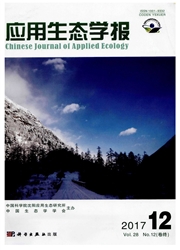

 中文摘要:
中文摘要:
研究了大型海藻龙须菜(Gracilaria lemaneiformis)对不同浓度重金属铜(0、25、50、100、250和500μg·L^-1)胁迫的生理响应.结果表明:当Cu^2+浓度≥50μg·L-1时,龙须菜藻体的相对生长速率显著下降,最大光化学量子产量、最大相对电子传递速率和相对电子传递效率呈相同的变化趋势.随着Cu^2+浓度的升高,龙须菜藻体最大净光合速率和光饱和点显著降低,而光补偿点显著升高,叶绿素a、类胡萝卜素和藻胆蛋白含量则呈先升高后下降的趋势;当Cu^2+浓度达到500μg·L^-1时,叶绿素a、类胡萝卜素和藻胆蛋白含量显著下降.说明龙须菜在低浓度Cu^2+胁迫下具有一定的抵抗能力,而当Cu2+浓度≥50μg·L^-1时,会对藻体生理活动造成显著的抑制作用.
 英文摘要:
英文摘要:
Gracilaria lemaneiforrnis was exposed to 0, 25, 50, 100,250 and 500 μg·L-1 of Cu^2+ to study its physiological responses to Cu^2+ stress. When the Cu^2+ concentration was 250 μg·L-1, the relative growth rate (RGR) of G. lemaneiforrnis decreased significantly, and the optimal quantum yield (Fv/Fm ) , the maximum relative electron transfer rate (rETR ), and the relative electron transfer efficiency (α) exhibited the same variation trend, compared with the control. With the increase of Cu^2 + concentration, the maximum net photosynthetic rate (Pmax) and light saturation point (LSP) decreased significantly, light compensation point (LCP) had a significant increase, while chlorophyll a, carotenoid, and phycobiliprotein contents decreased after an initial increase. When the Cu^2+ concentration reached 500μg · L^-1, the chlorophyll a, carotenoid, and phyeobiliprotein contents decreased significantlv. It was suggested that G. lemaneiformis could tolerate low concentration Cu^2+ stress, but its physiological activities were inhibited markedly when exposed to ≥50μg ·L^-1 of Cu^2+.
 同期刊论文项目
同期刊论文项目
 同项目期刊论文
同项目期刊论文
 Effects of elevated CO2 on the red seaweed Gracilaria lemaneiformis (Gigartinales, Rhodophyta) grown
Effects of elevated CO2 on the red seaweed Gracilaria lemaneiformis (Gigartinales, Rhodophyta) grown Impacts of increased atmospheric CO2 concentration on photosynthesis and growth of micro- and macro-
Impacts of increased atmospheric CO2 concentration on photosynthesis and growth of micro- and macro- Daily timing of emersion and elevated atmospheric CO2 concentration affect photosynthetic performanc
Daily timing of emersion and elevated atmospheric CO2 concentration affect photosynthetic performanc 期刊信息
期刊信息
